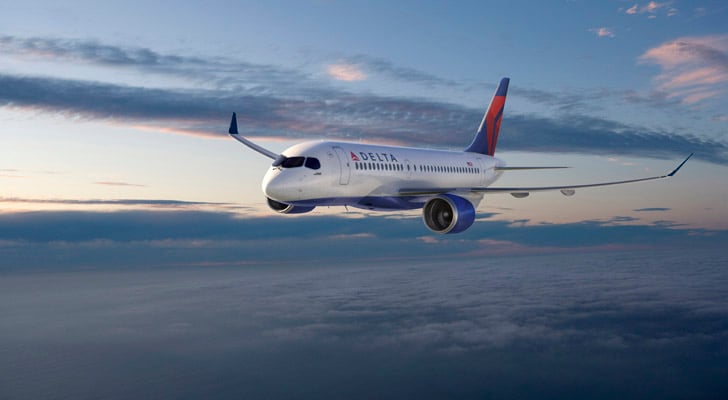When it reports on Tuesday, Delta Air Lines (NYSE:DAL) will probably beat its earnings estimates because it has already marked them down. Delta sent the whole airline sector tumbling Jan.3, and its own stock dropped 10% within a few trading sessions, after estimating it would make just $1.25-1.30 per share during the December quarter.
Analysts now expect Delta to beat that slightly, earning $1.31 per share on revenue of $10.83 billion.
Until its pre-announcement, Delta had been the strongest player in a weak airline group, dropping just 4.5% over six months while the most popular industry ETF, the SPDR S&P Transportation XTN (NYSARCA:XTN) fell 8.5%.
Over the last year, Delta shares have shed 18% of their value.
DAL Stock Investors Don’t Like Competition
On the surface Delta looks like a bargain with a price to earnings multiple of just 9.3 as trading opened Monday, and a market cap of $33 billion that’s just three quarters its annual revenue, which should come in around $44 billion.
But the entire airline group is cheap. Southwest Airlines (NYSE:LUV) sits at just 7.5 times trailing earnings, while American Airlines Group (NYSE:AAL) sells for 13 times earnings and United Continental Holdings (NYSE:UAL) sells for 10.
Airlines are always threatening to become competitive, and investors hate competition, which can quickly turn black ink red. What caused Delta stock to turn down early this month was news that revenue per passenger mile would be up just 3% in December, while
passengers boarded would be up 6.5%, the result of competition.
The airline sector was ruined by competition in the 2000s with most major airlines, including Delta, declaring bankruptcy at one time or another. During that decade Delta merged with Northwest Air, and many analysts credit Northwest managers with turning Delta around.
Worse Overseas for Delta
The level of competition in the profitable U.S. market is manageable, but Delta also faces intense competition overseas from national airlines that are subsidized by their governments, especially from the Middle East. Delta CEO Ed Bastian recently complained that after buying Air Italy, Qatar Air subsidized its heavy entry into the U.S. market, violating international treaties. Qatar denies the charge.
One way to fight back is through code sharing, putting the Delta name on flights by other airlines, and vice versa. Delta recently expanded into Africa in this way, through a code sharing deal with Kenya Airlines.
Delta has also tried to fight back against subsidized international competitors with business class seats that fold out into beds and with its own weather technology that reduces turbulence but most people still choose airline tickets based entirely on price, which requires airlines to turn everything into an up-sell in order to find profit and winds up angering passengers.
Comfort is especially important on international flights that can last 15 hours at a stretch. By adding small bits of room, and charging for them, Delta can raise its revenue per seat-mile, but passengers are aware of every class distinction within the coach cabin and complain loudly about it.
The Bottom Line
An airline seat that flies empty, like a hotel room that’s unused, is lost revenue, so airline stocks are very sensitive to turbulence in either the domestic or international economy.
This impacts Delta just like every other airline. Getting new, more reliable and fuel efficient or luxurious planes, doesn’t change the equation, because other airlines can do the same. The fact that it has been nearly 10 years since lives were lost on a scheduled U.S. air flight is now assumed.
Expect Delta and other airline stocks to remain cheap on a relative basis, and even become cheaper, as economic turbulence increases, whether results are impacted or not.
Dana Blankenhorn is a financial and technology journalist. He is the author of a new mystery thriller, The Reluctant Detective Finds Her Family, available now at the Amazon Kindle store. Write him at danablankenhorn@gmail.com or follow him on Twitter at @danablankenhorn. As of this writing he owned no shares in companies mentioned in this article.

